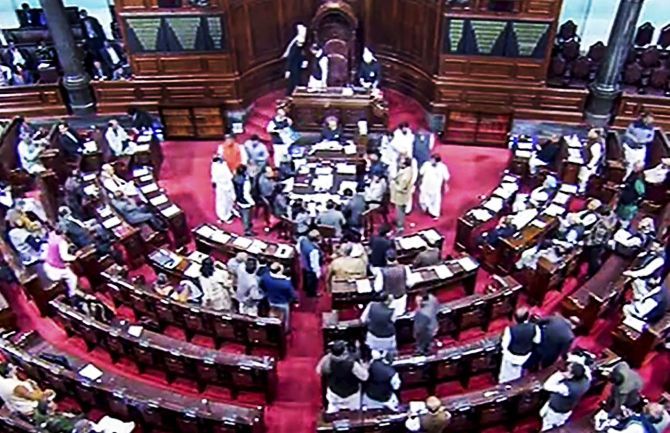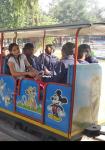A private member resolution seeking that the government implement the recommendations of the Sachar Committee report and other reports that have discussed the educational and social backwardness of Muslims and enact a legislation for the prevention of atrocities against minorities was moved in the Rajya Sabha on Friday.

During the private members' business in the Upper House of Parliament, Abdul Wahab of the Indian Union Muslim League (IUML) moved the resolution and demanded the formation of a Joint Parliamentary Committee (JPC) or a judicial commission headed by a retired Supreme Court judge "to study the evictions that have been carried out as a form of collective and arbitrary punishment against the Muslim minority and low-income communities".
"Sachar Committee Report, 2006 and Ranganath Mishra Commission Report, 2007 reveal that the condition of Muslims in India is worse than SCs (Scheduled Castes) and STs (Scheduled Tribes)," Wahab said.
One-fourth of the Muslim children in the age group of 6-14 years have either never attended school or are dropouts, he said, citing the Sachar Committee report.
Wahab also pointed out that for children above the age of 17 years, the educational attainment of Muslims at higher education is 17 per cent as against the national average of 26 per cent.
Only 50 per cent Muslim children, who complete middle-school education, are likely to complete secondary education, compared to the national average of 62 per cent, he said.
"The Muslim population comprises 14 per cent of the national population, but their representation in higher education is very low. Only 5.5 per cent Muslims are there in higher education," the IUML leader added.
Only 13 per cent Muslim women in the country get to the level of higher education, which is too low according to the all-India National Sample Survey Organisation (NSSO), 2018 report, he pointed out.
Wahab further said according to the NSSO, 2018 report, Muslims are the lowest represented group in salaried-class employment and account for a mere 2.67 per cent of directors and senior executives among the Bombay Stock Exchange (BSE) 500 companies.
Citing Human Rights Watch and other such reports, he said there has been a constant increase in attacks against lower-class Muslims in the country in recent times.
"In the last few months, a new pattern has emerged to evict and bulldoze properties," Wahab said, citing certain instances in Uttarakhand and Assam.
Therefore, he said, "I propose that the House urges upon the government to implement the recommendations of the Sachar Committee report and other reports that have discussed the educational and social backwardness of Muslims."
Wahab also sought the reinstatement and enhancement of the scholarship and other such programmes that aimed to improve the higher education participation of Muslims and help madrassas modernise with special infrastructure funds.
Besides, he called for the constitution of a JPC or a judicial commission headed by a retired Supreme Court judge to look into the evictions carried out as a form of collective and arbitrary punishment against Muslims and other low-income communities.
The IUML leader also called for the enactment of a legislation for the prevention of atrocities against minorities, so as to "build confidence amongst Muslims, who are vulnerable".
Taking part in the discussion, Jawhar Sircar of the Trinamool Congress (TMC) supported the motion and pointed out that the Union budget for 2023-24 has slashed the allocations for the minority welfare department by 40 per cent.
Today, he said, Muslims have been put on the defensive but they had never asked for it.
There is a pall of fear and terror among Muslims in India, Sircar said.
John Brittas of the CPI-M lamented that Wahab's resolution lacked clarity in highlighting matters that have gone against Muslims.
Referring to the hijab row in Karnataka, he said as a result of the controversy, "more than one lakh Muslim girls backed out of government colleges in Karnataka alone".
The enrolment of Muslim girls in educational institutions has come down drastically, Brittas said, adding that it should have been the other way round.
Javed Ali Khan of the Samajwadi Party (SP) also supported the motion and stressed the need to focus on issues like education and employment while talking about the growth and development of minorities.
Jebi Mather Hisham (Congress) said there is a growing intolerance in the country today towards Muslims and backward communities.
She noted that instead of harbouring such an attitude, efforts should be made to support the communities that are lagging behind.
Manoj Kumar Jha of the Rashtriya Janata Dal (RJD) said a divided society does not bode well for the country.
He noted that Muslims are living in fear in the country and are reluctant to express themselves freely.
Jha noted that dividing the society on religious lines can be good for electoral purposes, but will have a drastic impact on the country.
He also pointed out the role of television channels in spreading hatred amongst various communities.
V Sivadasan of the CPI-M) noted that diversity is the spirit of India and alleged that the present government is trying to destroy it.
He said instead of promoting health and education, the BJP-led government is promoting things like cow hugs.
Supporting the motion, Sandosh Kumar P of the Communist Party of India (CPI) said the government claims "sabka saath sabka vikas" but in reality, it is against Muslims and backward communities.
He also accused the government of systematically promoting Islamophobia in the country.
Rakesh Sinha of the ruling Bharatiya Janata Party (BJP), however, said the government's effort has always been for the development and welfare of the poor, irrespective of caste, creed or religion.
He said the government's free ration scheme does not discriminate against anyone on the basis of religion or caste. Similarly, the scheme to make quality generic medicines available to the poor through jan aushadhi kendras also never isolates any community or religion when it comes to distributing its benefits, he added.
Imran Pratapgarhi of the Congress said the government claims "sabka saath sabka vikas" and wondered why is it opposing a bill for the development of minorities.
"Even during 'Amrit Kaal', a budget is presented and a reduction of 38 per cent made in the budget for the minorities. And then they claim 'sabka saath sabka vikas'," Pratapgarhi said.
GVL Narasimha Rao of the BJP said his party has opposed the Sachar Committee report as it was a patently communal exercise. It reflected the politics of minorities and the politics of appeasement, he said.
"This was an effort for vote-bank politics. This was an example of pseudo-secularism," he added.








